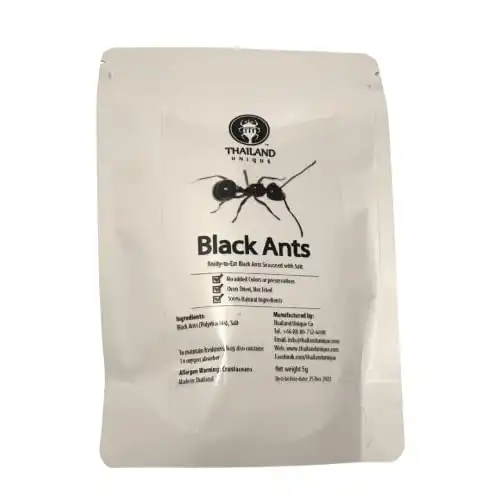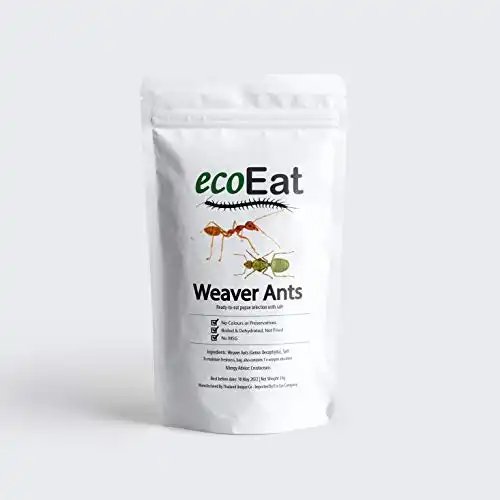5 Benefits of Eating Ants for Better Health
Eating ants can provide protein, minerals, vitamins, and fiber with healing properties and a sustainable food source, making it a healthy and fun experience worth trying in various cultures worldwide.

Many people regard ants as a nuisance rather than something to consume. Yet some people have tried this treat as a curious child or a daredevil looking for an exhilarating experience. However strange, there are reasons you should at least try eating ants.
Although insignificant amounts, consuming the common ant can provide protein, minerals, vitamins, and fiber. Ants also have healing properties, and they are a sustainable food source that is quite common in dishes in Latin America, Asia, and Australia.
An entire field of study exists related to eating ants and other insects called entomophagy. Eating ants is nothing new and has been around for thousands of years, yet people now know ants as a healthy food source.
The culinary world is slowly waking up to this tidbit. Even though it was already a staple in the diet of hunters and gatherers. Here are some reasons you should try eating ants.
Disclosure: As an Amazon Associate, this site earns from qualifying purchases. Thank you!
Ants Are Healthy
Looking at a tiny ant, you would be forgiven for having suspicions about its nutritional value. Ants offer many different nutrients, albeit in small quantities. These nutrients include:
- Protein
- Minerals (e.g., zinc, potassium, calcium, phosphorus, and iron)
- Vitamins B and C
- Fiber
You will have to consume many ants to get a real health kick, probably more than what your instinct might lead you to eat, but it is worth a try. Something to note is that ants taste different as they progress through each metamorphic phase, from eggs to adulthood, yet include something beneficial and nutritious for humans at any stage.
Ants Have Medicinal Properties
Many regard ants as a superfood. Besides being a source of vitamins and minerals, the insect fiber found in ants, called chitin (ky-tin), lowers serum cholesterol levels. Research has also discovered that chitin has antibacterial and antiviral qualities. Other healing benefits include:
- Treating heart illness
- Aiding in managing diabetes
- Controlling blood pressure
- Increasing stamina
- Treating the liver
- Boosting digestion
- Lowering risks of heart disease and cancer
Although many believe eating ants can cure gout, more recent sources suggest it might worsen the symptoms. Ants contain purine, which is broken down to form uric acid. Uric acid, when overly produced, is the main contributor in causing joint pain.
Ants Are A Delicacy In Many Countries
Ants are very versatile. You can eat raw, roasted, or fried ants, which may be readily available on travels to different countries. So why not look out for them?
Australia
In Australia, the Aboriginals are famous for eating Honeypot ants. Amongst the ant species, these ants have specific workers (also called repletes) that get crammed with nectar by other ants. The Honeypot ants then become so full that their abdomens swell to an alarming size and become immobilized. Nevertheless, the ants retain the nectar, serving as storage for other ants when food becomes scarce.
Famous personalities like David Attenborough and Gordon Ramsay have tried the Honeypot ants straight out of the wild.
Latin America
Visit South American countries like Columbia or Brazil. You can easily find a restaurant with ants on the menu. Leaf-cutting ants are prevalent in this part of the world. People roast these ants, giving them a saltier taste to the point that they resemble bacon, peanuts, or even popcorn.
In Mexico, people enjoy ants in a dish called Escamoles. Ant larvae and pupae are cooked with onion, chili, and epazote leaves to form a delicious filling or side dish to tacos and tortillas.
Asia
The ants of choice are weaver ants in countries like China, Thailand, Malaysia, and the Philippines. Here, a popular cooking method is to sauté the ants, or you can get your fire ants and larvae stir-fried and served as condiments.
Ants Are A Sustainable Food Source
With a growing global population comes the need to find more sustainable food alternatives. Since ants are edible and a source of nutrients, they are emerging as a food trend to sustain us in the future. This trend is mainly down to the fact that ants have a low environmental impact:
- They emit little ammonia and greenhouse gases.
- They don’t require much water.
- They don’t pose any risks to animal and human welfare.
For ants to become a viable solution to the food crisis, scientific researchers need to investigate, design, and test sustainable collection practices that will not be detrimental to the environment.
Eating Ants Is A Fun Experience
Even if you are not after ants’ nutrients or healing properties, you might still be a thrill seeker wanting to try them for fun. People are getting used to eating frowned-upon animals, like crocodiles, snakes, scorpions, and other insects. Eating ants is a great travel story you will remember for a long time. You might end up including them in your diet.
Frequently Asked Questions
What Do Ants Taste Like?
As you can imagine, with 12,000 species of ants, there is no one simple answer. Still, many ants taste the same, which helps to narrow the field. Most common ants have a citrus taste, almost like lemon. This flavor is due to the formic acid they produce.
Other ants, like the Honey ants, taste sweeter since they are filled with honey. The sweetness makes them slightly more bearable to consume. They also require less preparation since their flavor is good on its own.
With ants growing in popularity, people are constantly experimenting with different ways to prepare and eat ants. For example, suppose you prefer savory flavors. In that case, you will feel at home in South America, where they commonly roast ants and add spices to acquire a pleasant taste.
What Happens If I Accidentally Eat An Ant?
The ant will die.
Humor aside, accidentally eating a common ant will not affect you. In larger quantities, you will get a stronger sense of their taste and some extra vitamins and minerals you weren’t necessarily planning on getting. But nothing unfortunate will happen to you.
But, if you eat a fire ant, you will know it before swallowing. A fire ant will typically bite or sting you if they remain alive in your mouth. Their attack will cause a burning sensation and swelling, resulting in discomfort or intense pain. If this happens, you need to seek medical attention.










